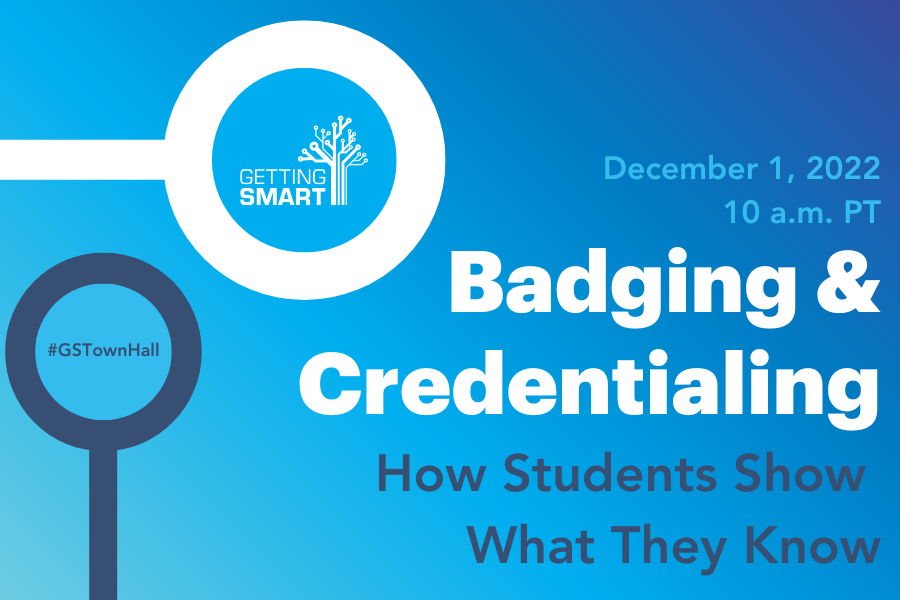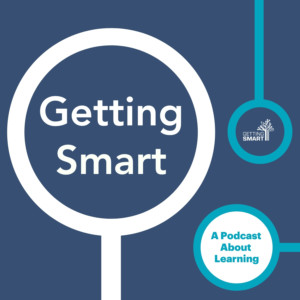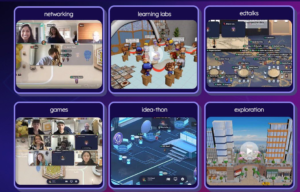Town Hall Recap: Badging & Credentialing

On the recent Getting Smart Town Hall we took a look at a number of organizations and technologies that enable powerful badging and credentialing opportunities to help students share their stories, their learning and their priorities.
You can find the link mentioned during the town hall, here.
We must make the process of credentialing as convenient as standardized testing in order for it to take hold.
David Kidd
Credentialing is the new way to communicate capabilities and provides more reliable and precise capability signaling than courses and grades. Together, we explored the secondary and postsecondary learning and employment ecosystems where credentialing is emerging, how it complements skills-based hiring, and the implications for learner records.
Our Guests
We were joined by Project Director of Project Zero, David Kidd as well as Director of Product Management at XQ, Rachel Safferstone. These two guests are doing incredible work in the space of credentialing and badging and both the vision and the experience to help us better understand the broader landscape.
David shared about his recently published white paper which discusses how a competency-based badging infrastructure is “Measuring and recording learner mastery of competencies and reporting on that mastery by awarding learners badges that are accredited by an independent body of assessment experts.” This independent body of assessment experts is one of the core elements of this new approach – allowing for third-party verification of credential infrastructures.
Rachel shared about the impressive work that XQ is doing with their math badging system:
When badges are given for purpose-driven learning instead of just classroom instruction then artifacts of learning by doing become the feasible/credible evidence of learning. Otherwise, we’re just doing grades 2.0.
Michael Robbins
Questions
As always, our audience was very engaged in the chat. They shared tons of great examples, information and TONS of questions. Below are a list of some of the most thought-provoking wonderings from our audience:
- Is there a list of agreed upon (developmentally appropriate) competencies to start with?
- What’s the connection between the current work and higher ed and higher ed to industry?
- Who sits on the badging and credentialing boards? Who appoints them?
- How do we make the process of creating and certifying badges simpler?
- How are these badges being issued to learners? Are they integrated into an LMS or delivered to some kind of digital wallet?
- Where in the math badging process can the required content be questioned? Many argue that our high school math curriculum is totally obsolete.
- How would that process get assessed? Would teachers be required to send in a curriculum like they do to College Board for AP courses?
- Is the thinking that the badging board might be best as parts of traditional Departments of Ed or is there an idea for an independent, entity that might not be wed to traditional “grading baggage?”
- Is a tech stack that is owned by the international commons ( public) being considered?
- Do you intend to have actual evidence/performances/products accessible with the digital badges/credentials, so colleges, employers, etc can see the rose (the work
- Do you foresee Badging Boards operating under one larger organization or could each be independent entities, like maybe a DAO?
- Is there a barrier around including, in the overall assessment and measurement, the things the learner does outside of the school context, but which relate to it? Violin practice, work placement internship… external assessors in the mix of credibility? Will we get a more inclusive picture out of all this, or continue to leave that part out?
What’s Next?
We are thinking a lot about badging and credentialing and you can expect a number of resources in the new year. We will be hosting our annual “What’s Next in Learning” Town Hall on January 25th, 2023. We hope to see you there!





0 Comments
Leave a Comment
Your email address will not be published. All fields are required.